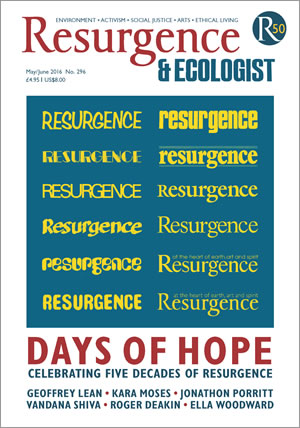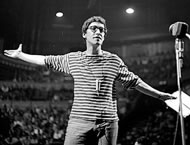I made some notes for when you came, but, now, where are they...?” Michael Horovitz smiles disarmingly as he stares at the piles of papers that tower around him, some spilling over the desktop.
Our teacups perch precariously. All around us, shelves of books and more stacks, boxes and bags of papers, magazines and all manner of printed ephemera tell of the life and interests of an extraordinary man of letters – and a witness to the beginnings of Resurgence.
Horovitz is now in his eighties. He has been writing, editing, performing and, above all, championing poetry since the 1950s. A contemporary and friend of the Beat writers, Allen Ginsberg, William Burroughs, Gregory Corso, Lawrence Ferlinghetti et al., he has continued to encourage and inspire writers and performers from outside the literary mainstream to this day.
“It’s because of you, and your [1969] anthology Children of Albion, which I read at school, that I’m doing what I am today,” I once heard a literary academic tell him.
In the Resurgence story, however, Horovitz has several positions of note. He wrote the first poem ever published in Resurgence, was a witness to the magazine’s gestation, knew the extraordinary group of people who inspired and nurtured it, helped edit one of its first joint issues, and has followed its progress ever since.
The old cliché has it that if you can remember the Sixties, you probably weren’t there, but the story begins in June 1965. Horovitz, whose family fled Nazi Germany in the 1930s, studied at Oxford in the 1950s and by the end of the decade was writing poetry and editing his New Departures publications, inspired above all by the radical poetry and politics of William Blake. Drawn to London’s nascent counter-culture, he performed at (“and helped disorganise”, he smiles) the extraordinary International Poetry Incarnation that drew more than 8,000 people to pack London’s Royal Albert Hall on 11 June 1965 for a smoke-filled jamboree of underground verse.
Peter Whitehead’s grainy black-and-white film of the event, Wholly Communion, shows the young Horovitz performing. Somewhere in the audience, Horovitz thinks, was John Papworth, who was to be the founder editor of Resurgence.
The two met some time afterwards, Papworth enthusing about the Albert Hall event. “John invited me to come to a party in Nevern Road [in Earls Court, west London], where he and his French wife Marcelle, who shared John’s libertarian outlook, lived. I immediately knew he was a kindred spirit,” Horovitz recalls. “My wife Frances and I immediately befriended them.
“John nearly always had a big sparkle in his eye, and he was full of openness. His voice would frequently take on a plaintive note – not unhappy, but giving a sense of somebody who cared passionately for a godforsaken world. He loved debate. He was what would be called a contrarian today. Although he was quite a wild protester, he had a lot of knowledge and also a talent for bringing people together and generating enthusiasm.”
It was the first of many such evenings. “They were great hosts, served delicious foods, [and] knew lots of interesting people coming in and out with stimulating ideas to improve the world and bring about peace.” Horovitz smiles at the memory.
The Albert Hall event had helped catalyse the radical side of what would be dubbed (by Time magazine, the following year) ‘Swinging London’. Gradually, ideas for a new magazine began to take shape.
“My sense of the chronology is not detailed,” Horovitz admits, “but there were more meetings and parties, and more people and gradually still more big shots such as Fritz Schumacher and Leopold Kohr and Herbert Read who became the core group who formed the main input for the first issues [of Resurgence] – as well as the Rev Michael Scott, who was very concerned about helping people suffering in Africa.
“And at one of these gatherings, with lots of lovely food and drink, John made a little speech – he was often given to making speeches – making the concrete resolution that quite soon this magazine was to appear.”
For the first issue of Resurgence, in May 1966, Michael Horovitz contributed a poem, For Modern Man (1914–1964), R.I.P., which he’d read at the Albert Hall. He reads it again for me, a mixture of the personal and the political, a cry for peace from a man whose family and generation had known the horrors of war, and it’s easy to see why it would have appealed to John Papworth, himself a peace and anti-nuclear activist.
Thereafter, Michael Horovitz was a close observer and sometime collaborator as Resurgence became an established feature of the radical publishing scene. In 1970 there was even a joint issue of Resurgence and New Departures – described unkindly by one commentator as “one of those far-out arts avant-garde quarterlies which with any luck come out every four years…”
“It seemed a good idea to me, since it meant we’d get another issue of New Departures out,” recalls Horovitz with a grin. A mixture of poetry and alternative politics, the joint issue characterises what has become a defining aspect of Resurgence – a desire to bring together ideas of social justice and the arts, environment and equality, the local and the international. For good measure, John Papworth included an open letter to John Lennon and Yoko Ono.
Fifty years on, Horovitz still enjoys reading Resurgence. His own output continues. An OBE in 2002 recognised his services to literature. Horovitz’s 2007 work, A New Waste Land: Timeship Earth at Nillennium, was a remarkable political deployment of poetry to denounce attacks on peace and the environment. The playwright Tom Stoppard called it “A true scrapbook and songbook of the grave new world”. In 2011 Horovitz contributed to an eBook, Emergency Verse: Poetry in Defence of the Welfare State. His engagement continues, and he is still active on the performance circuit, often appearing with his group, the William Blake Klezmatrix, and accompanying his poems with musical blasts on his self-constructed ‘anglosaxophone’. Catch him while you can.
Our teacups have, remarkably, survived the threat of paper avalanche, though their contents are cold. But as I rise to leave, Michael Horovitz raises his cup to improvise a toast – in suitably Blakean style – to the magazine he first wrote for half a century ago:
“Let Resurgence thrive!
And engender,
evermore,
Mental War
… and Global Peace!”
It’s a fine note to end on. And continue.
Read the full poem For Modern Man (1914–1964), R.I.P. in pdf format
Michael Horovitz reads For Modern Man (1914–1964), R.I.P. in a special filmed interview at www.resurgence.org/horovitz








